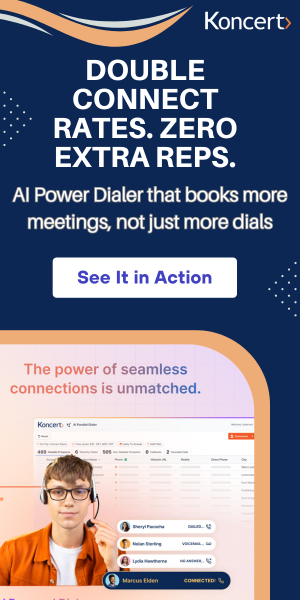4 min read
What is AI sales automation, and how does it work?
By: Koncert Marketing on Jun 12, 2025 11:16:29 AM
AI sales automation refers to the use of artificial intelligence and machine learning technologies to automate, optimize, and enhance various stages of the sales process. It goes beyond traditional automation, which simply follows predefined rules, by leveraging AI's ability to learn, adapt, and make intelligent decisions based on data.
The core idea is to free up sales professionals from repetitive, administrative tasks so they can focus on high-value activities like building relationships, negotiating deals, and strategic planning.
How AI Sales Automation Works
AI sales automation works by integrating AI capabilities into sales software (like CRM systems) and various sales tools. Here's a breakdown of how it functions across different sales processes:
Lead Generation and Prospecting:
-
Data Analysis: AI can analyze vast datasets from various sources (CRM, social media, public records, intent data platforms) to identify ideal customer profiles (ICPs) and discover new, high-potential leads that a human might miss.
-
Predictive Lead Scoring: Machine learning algorithms evaluate leads based on their likelihood to convert. They consider factors like demographics, online behavior (website visits, content downloads, email opens), engagement history, and even external market signals. This allows sales reps to prioritize their efforts on the most promising leads.
-
Automated Prospecting: AI can automate the research of contacts within target accounts, finding relevant decision-makers and their contact information.
Sales Outreach and Engagement:
-
Personalized Messaging (Generative AI): AI, especially Generative AI (like LLMs), can draft highly personalized emails, messages, and even call scripts. It analyzes prospect data to tailor content that resonates with their specific pain points, industry, and interests, making outreach more effective and less robotic.
-
Automated Follow-ups: AI can schedule and send automated follow-up emails, reminders, and even trigger tasks based on prospect engagement (e.g., if a prospect opens an email, a follow-up is automatically sent).
-
Optimal Timing: AI analyzes past interaction data to suggest the best times to contact prospects for maximum engagement, based on their individual behavior patterns.
-
Conversational AI (Chatbots & Virtual Assistants): AI-powered chatbots can handle initial inquiries on websites, qualify leads by asking a series of questions, provide instant answers to FAQs, and even schedule meetings directly with sales reps. This frees up human reps for more complex conversations.
CRM Data Management and Pipeline Management:
-
Automated Data Entry: AI can automatically log call notes, update customer records, and capture interaction details from emails, calls, and meetings directly into the CRM, significantly reducing manual data entry for sales reps.
-
Deal Forecasting: AI analyzes historical sales data, current pipeline status, and various influencing factors to provide more accurate sales forecasts, helping sales leaders make informed decisions.
-
Risk Analysis: AI can identify deals that are at risk of stalling or being lost by analyzing sentiment in communications, engagement levels, and historical trends. It can then recommend actions to mitigate those risks.
Sales Enablement and Coaching:
-
Content Recommendations: AI can recommend the most relevant sales content (case studies, whitepapers, presentations) to reps based on the specific prospect, their industry, and their stage in the sales cycle.
-
Call Transcription and Analysis (Conversation Intelligence): AI transcribes sales calls and analyzes the conversations for sentiment, keyword usage, talk-to-listen ratio, and adherence to sales best practices. It can then provide real-time suggestions to agents or post-call insights for coaching.
-
Sales Coaching: AI can create personalized coaching plans for reps based on their performance data, identifying areas for improvement in their sales skills.
Pricing and Upselling/Cross-selling:
-
Dynamic Pricing: AI can analyze market trends, competitor pricing, and customer data to suggest optimal pricing strategies in real-time, maximizing profitability while remaining competitive.
-
Recommendation Engines: By analyzing customer purchasing history and preferences, AI can identify opportunities for upselling (selling a more expensive version) or cross-selling (selling complementary products/services).
Key Benefits of AI Sales Automation:
-
Increased Productivity: Automates repetitive tasks, allowing sales reps to spend more time on selling and building relationships.
-
Higher Conversion Rates: Intelligent lead scoring, personalized outreach, and timely follow-ups lead to more qualified leads and higher conversion rates.
-
Enhanced Personalization at Scale: AI enables hyper-personalized communication and recommendations that would be impossible to achieve manually for a large number of prospects.
-
Improved Decision-Making: Data-driven insights from AI help sales leaders and reps make smarter decisions about lead prioritization, forecasting, and strategy.
-
Reduced Costs: Optimizes agent time and streamlines processes, leading to lower operational expenses.
-
Better Customer Experience: Faster response times, personalized interactions, and proactive support lead to higher customer satisfaction.
-
More Accurate Forecasting: AI's ability to analyze vast data sets leads to more reliable sales predictions.
In essence, AI sales automation transforms the sales process from a manual, often guesswork-driven activity into a highly efficient, data-driven, and intelligent operation. It augments human sales teams, allowing them to perform at their best and focus on the unique human elements of sales.
Related Posts
10 min read
AI Sales Roleplay Playbook - Master Cold Calling & Objections
Dec 18, 2025 by Koncert Marketing




